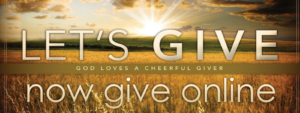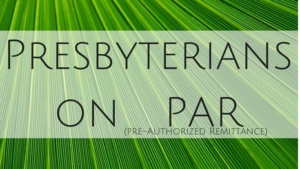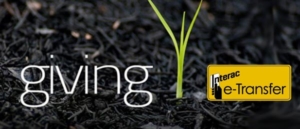Come as you are.
Life-long Jesus follower, or never cracked open a Bible. Shirt and tie guy, or jeans and sneakers person. You are welcome here. We invite you to join our perfectly imperfect community where we explore together the big questions: What’s the meaning of life? Does my life have a purpose? Who is Jesus? What does it mean to be a Christian? No question is dumb or insignificant. We explore these together, we seek to bring hope and healing in our neighbourhood and city through practical projects all while having fun and the odd potluck!
One Service. Three Ways:

On Line
Join Us From Home or Away via Zoom
Go to: https://zoom.us/
Click “Join a meeting” > meeting ID: 786 765 4264 > password: 184 928
OR Call Toll Free: 1 855 703 8985 > meeting ID: 786 765 4264 > password: 184 928

In Person
Join Us
St Paul’s Presbyterian Church
1545 Monaghan Road – enter at McDonnel Street
Join us at St Paul’s Presbyterian worship sanctuary located at the front north corner of The Mount Community Centre
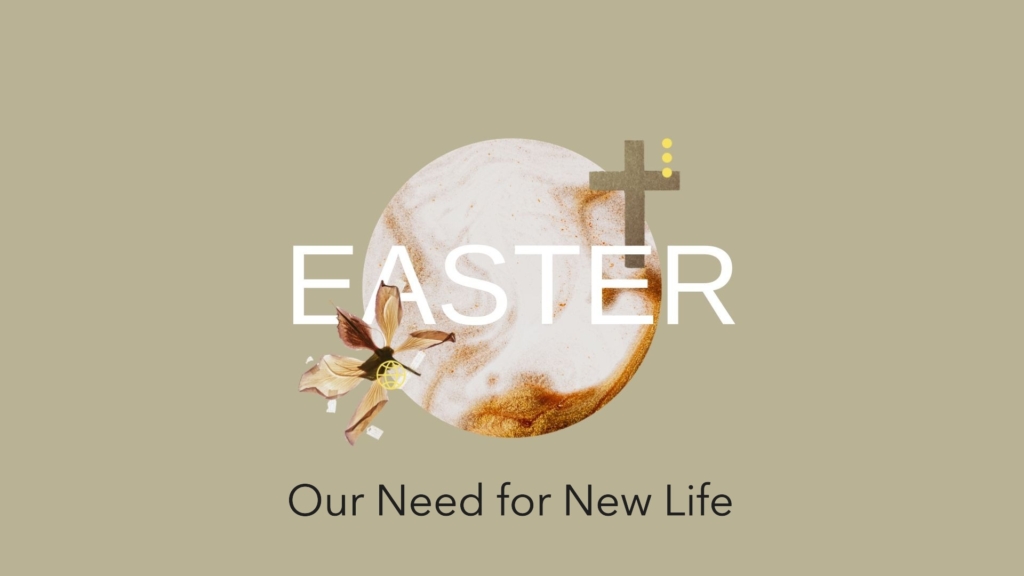
Where do you find yourself this Easter? Are you happy, hopeful, fulfilled? Do you feel valued, supported, loved? or do you feel like life has gotten off track…that you’re not where you dreamed you be at this stage of life. Perhaps you feel it is “too late” to change course and make changes…to somehow lead a new, different, better life.
Ah…but that is exactly what Easter is all about! As they watched Christ die on the cross, the disciples dreams of liberation died with him. It was too late — it was all over, or so they thought.
But theirs was a hasty conclusion. Christ would meet their need for new life in a completely unexpected way, and not just theirs but all of humankind’s!
Join us as we celebrate Christ’s resurrection and our assurance that God can and does continue to bring new life to even the most desperate situations and lives.
To prepare, read ahead: Isaiah 65:17-25 and Luke 24:1-12.
April 18 2025 - Good Friday - All We Need: Protection
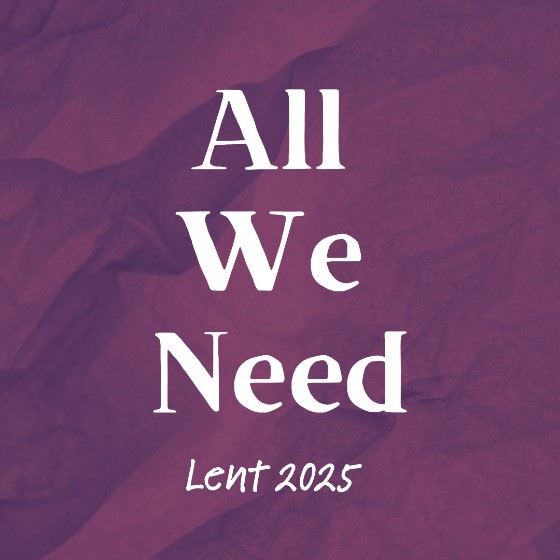
We hope you can join us for a special Good Friday service to be held at 10 a.m. This will be a joint service with St. Stephen’s Presbyterian Church and will be held there. St. Stephen’s address is 1140 St. Paul’s Street, Peterborough.
The Rev. Wayne Reid will lead worship and I will deliver the message that will focus on the protection Christ’s death offers us.
We all have a need to feel safe and protected. As Jesus approaches the cross on Good Friday we see the disciples need Jesus’ protection as he is arrested; Peter needs the protection of anonymity as he tries to stay close to Jesus during the trial; Pilate desperately seeks protection from political pressures and Jesus’ mother needs protection as she stands at the foot of the cross.
And then, of course, there’s Jesus. Jesus needs protection too, but He has a greater need: the need to live according to His Father’s wishes, even as it leads Him toward death. And so, amazingly, wonderingly, this Christ, who could heal the sick, restore sight to the blind, still the wind and the waves, did not seek protection for himself, but willingly gave up his life for our safety and security, our protection as children of God.
April 17 2025 - Maundy Thursday
 Maundy Thursday, April 17th at 5:00 p.m. we will have a time of worship that is a re-enactment of the Last supper. A simple soup and bread meal will be served — gluten-free options will be available. So that we know how many people to expect, please RSVP to our office administrator, Joanne by email at office@stpaulspeterborough.ca by end of day Tuesday, April 15th or phone and leave a message at 705-745-1411.
Maundy Thursday, April 17th at 5:00 p.m. we will have a time of worship that is a re-enactment of the Last supper. A simple soup and bread meal will be served — gluten-free options will be available. So that we know how many people to expect, please RSVP to our office administrator, Joanne by email at office@stpaulspeterborough.ca by end of day Tuesday, April 15th or phone and leave a message at 705-745-1411.
Sunday April 13th 2025 - Palm Sunday

As we’ve progressed through our sermon series “All We Need” perhaps you have wondered: “Does God need anything? And if so, WHAT does God need?” The only place in scripture where Jesus explicitly asks for something he needs come in our Palm Sunday reading. He has need of a colt, the foal of a donkey. It’s not that he needs it for transportation, he could walk just fine. So why does he need a colt to ride now? It’s a question we’ll explore, but even more interesting is the response of both the disciples and the colt’s owner. They do not question or ask why the Lord is in need of it; they simply respond even in the absence of an explanation.
How about us? Do we often make our need for an explanation so important that we miss the opportunity to do what God invites us to do?
To prepare, read ahead: Psalm 31:9-16 and Luke 19:28-40.

This Sunday we continue with our Lenten Sermon series: All we Need by considering our need of change.
How do you feel about change? Do you view it as an adventure…a welcome departure from the usual routine of your life, or do you fear change and view it as unpleasant, perhaps even painful? In truth we have both types of change in our lives don’t we?
Change is a necessary part of life. We have only to think of the change necessary for a caterpillar to become a butterfly or the dry bulb to become a daffodil as two positive, and beautiful effects of change. Likewise Christ changed the status quo forever when he conquered death, a gift for all of us who follow Him.
This Sunday we will look at change in the life of the nation of Israel as they left behind their wilderness wandering and at long last entered the promised land. What can their journey teach us about ours? Join us Sunday to find out!
Sunday March 30th 2025 -***Service Pre-empted by Freezing Rain***


This Sunday we continue with our Lenten Sermon series: All we Need by considering our need of advocates.
At one time or another we all need someone in our corner. It could be that we need an advocate, in this case a lawyer, to help us prepare for an upcoming trial, other times, we may need someone with different skills or knowledge to assist us when we reach the limit of our abilities. (Like me, when I need to hang a piece of art at home – yikes!)
A clear example of human beings’ need for an advocate comes from Jesus’ teaching about the parable of the fig tree. The tree is saved from the ruthless efficiency of the vineyard owner by a patient gardener who counsels one more year of care. The gardener will meet the tree where it is with what it needs to be fruitful, in the same way that Christ, through the spirit, meets us where we are and gives us what we need to come through the trial, not only surviving, but thriving, bearing fruits for the reign of God.
To prepare, read ahead: Psalm 63:1-8; Corinthians 10:1-13 and Luke 13: 1-9.

There is much to rob us of much-needed sleep in our turbulent, ever-changing world. But Psalm 27 reminds us: “The Lord is my light and my salvation; whom shall I fear? The Lord is the stronghold of my life; of whom shall I be afraid.” We can sleep and rest secure because we know the one who has overthrown death itself. We are known and deeply-loved by the God of all creation.
This Sunday we will re-visit our story of the transfiguration and notice something we didn’t study on March 2nd when we visited this story on Transfiguration Sunday: the disciples were asleep during much of Jesus’ encounter with Moses and Elijah. Why might this be? Join us on Sunday as we explore this more deeply.
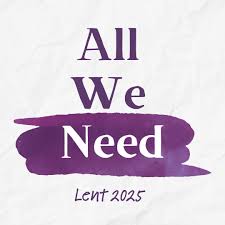 When we are vulnerable, afraid or weak we often are loath to admit we need help and to ask for it. But living in a way that denies our vulnerability is decidedly unhealthy.
When we are vulnerable, afraid or weak we often are loath to admit we need help and to ask for it. But living in a way that denies our vulnerability is decidedly unhealthy.
When Jesus was vulnerable he reached out to his heavenly Father in prayer and rooted himself in God’s word and promises. He also embraced vulnerability as it was a necessity to save us. The devil tempts Jesus with self-reliance that eschews help from anyone, including God. Yet Jesus knows that the source of everything, is God.
How can we too embrace our vulnerability and not deny or be ashamed of it…but instead to give it to God and trust him completely to supply all our needs? Join us this Sunday as we explore this question more deeply.
To prepare, read ahead: Deuteronomy 26:1-11 and Luke 4:1-13
Wednesday Mar 5th 2025 - Noon Ash Wednesday Service
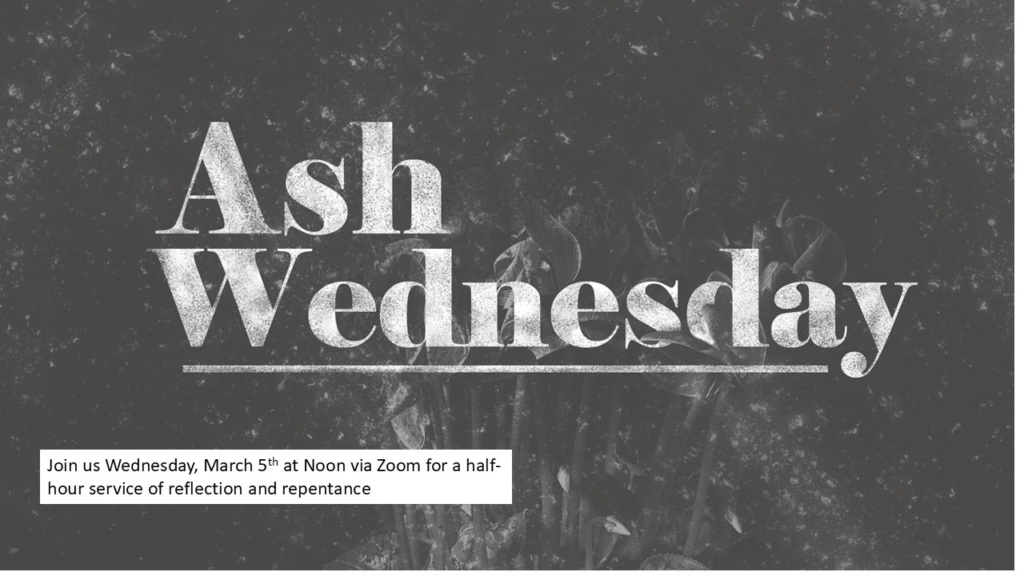
Join us on Zoom using the Sunday service link in StPaulsConnects email or the blue button above.
Sunday Mar 2nd 2025 - Light of the World
 Right now, in our world, there are so many voices competing for our attention. It is becoming increasingly difficult to separate fact from fiction and to know which voices we can trust as authoritative voices who are speaking the truth, and not for self-serving purposes!
Right now, in our world, there are so many voices competing for our attention. It is becoming increasingly difficult to separate fact from fiction and to know which voices we can trust as authoritative voices who are speaking the truth, and not for self-serving purposes!
Many people, it seems are seeking the spotlight for themselves, for profit or fame and are willing to compromise the truth in the process.
Into this chaos, our scripture readings for this week direct us toward Jesus, who stands apart as God’s beloved son, ablaze with a light of purity and glory. God says, “Listen to him!” When we do, we hear him say, “you are the salt of the earth and the light of the world.” Join us Sunday as we learn how to listen and root ourselves in God’s voice spoken in scripture and strengthened by it, to walk in our dark world as beacons of His light!
To prepare, read ahead: Matthew 5:13-16 and Luke 9:28-36.
Recording part 1
Recording part 2
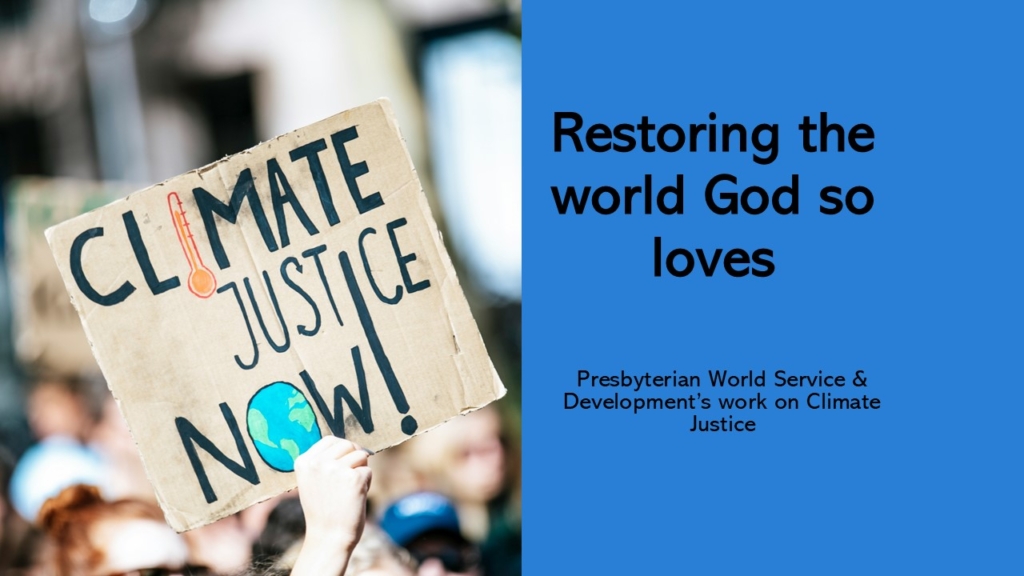
We are experiencing more and more extreme weather events throughout the globe. These are the result of climate change, and many of us have taken pains to educate ourselves on how we might modify our lifestyle or purchasing habits to lessen our contribution to global warming. However, have you heard anything about climate justice? Rich, developed countries contribute far more to global warming than poorer underdeveloped cocuntries, yet these poorer nations suffer far more from the impact of global warming. Join us Sunday as we study God’s account of creation in Genesis and the responsibility he entrusted to us to care for his good creation.
We’ll also learn how our international aid and development arm known as “Presbyterian World Service and Development” is working with other agencies to achieve greater climte justice. We will take up a special offering to support their work. Please prayerfully consider what you may be able to give to support this important work.
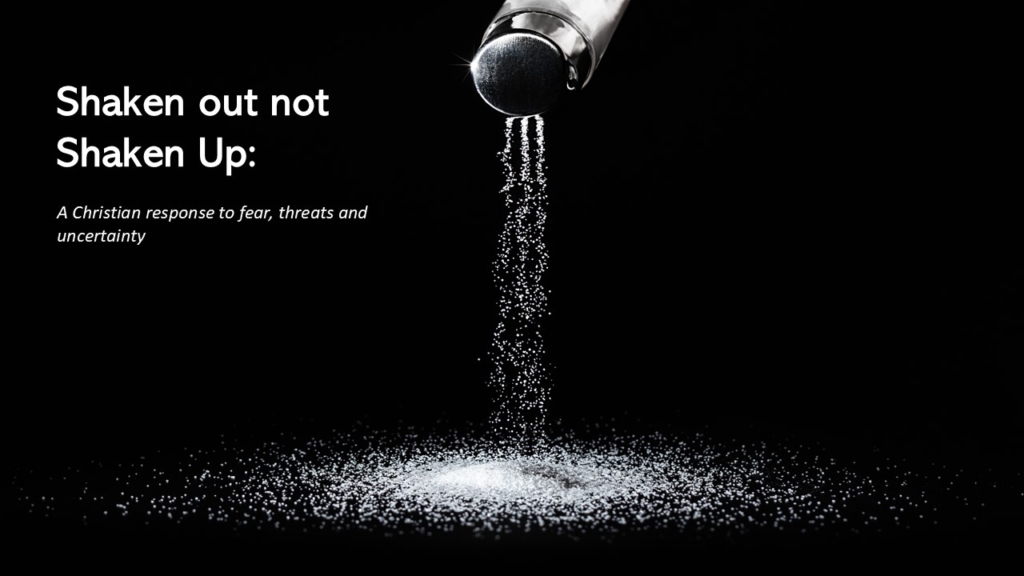
In English we have an expression that we sometimes use when describing another person: he (or she) is the “salt of the earth.” But what does that mean? It means they are a person of integrity, honesty, humility, they work for the good of themselves and others. This expression arises from Jesus’ Sermon on the Mount in the Gospel of Matthew where he gives wise counsel on how to live as people who belong to God’s kingdom even as they dwell here on earth. So what does it mean to be “salty” Christians and how can our saltiness add flavour and preservation to our lives and society in the midst of unjust trials?
Join us Sunday to find out!
Sunday Feb 9 2025 -

This Sunday as we come to the dramatic conclusion of Jonah’s story we discover that Jonah, having delivered God’s message to the people of Nineveh, doesn’t return home. Why is that? It appears that he hopes Nineveh won’t repent and they will get what Jonah feels they deserve! So he selects a ringside seat to the coming “fire and brimstone” show.
When God spares Nineveh the predicted destruction, Jonah’s attitude reveals something is still eating him – this time not a whale, but anger. He doesn’t share God’s compassion for the people and animals of Nineveh. He also fails to see that he himself is a recipient of God’s grace, and as such should desire such grace for others!
To prepare, read ahead: Psalm 103 and Jonah 4

This Sunday we rejoin the reluctant prophet Jonah as he finds himself suddenly and unceremoniously spit out on a Mediterranean beach. But while Jonah has been released from the belly of a large fish, he’s not off the hook from an assignment from God — the very same assignment he was given in the first place (and that he ran away from). God is giving Jonah a second chance to do the right thing. This time, Jonah does not delay in fulfilling his task and warning the people of the ancient capital of Nineveh of coming destruction.
How will they respond to God’s message delivered by Jonah? Will they gratefully respond to God’s second chance, or will they, like Jonah, turn their back on Him. How about us….how are we resonding here and now to God’s invitation to be part of his life-saving work?
To prepare, read ahead: Psalm 32 and Jonah 3
 Last Sunday we accompanied Jonah as he ran away from God and hopped onto a boat headed for Tarshish. But this wasn’t a pleasant Mediterranean cruise, but instead a near shipwreck as God sent a storm upon the sea. Jonah, in disobedience to God brought only more hardship upon himself and others. As we rejoin the story this Sunday we find Jonah deep in the belly of a whale. This may lead us to ask: how are we to understand this story? Is it pure fiction with a moral lesson, or is it an actual historical account of events? We’ll explore these questions as well as examine the content of Jonah’s prayer to God from inside the whale.
Last Sunday we accompanied Jonah as he ran away from God and hopped onto a boat headed for Tarshish. But this wasn’t a pleasant Mediterranean cruise, but instead a near shipwreck as God sent a storm upon the sea. Jonah, in disobedience to God brought only more hardship upon himself and others. As we rejoin the story this Sunday we find Jonah deep in the belly of a whale. This may lead us to ask: how are we to understand this story? Is it pure fiction with a moral lesson, or is it an actual historical account of events? We’ll explore these questions as well as examine the content of Jonah’s prayer to God from inside the whale.
To prepare, read ahead: Psalm 130 and Jonah 2
 This Sunday we will begin a new, four-part series on the Book of Jonah. Many of us may be familiar with the Book of Jonah from our Sunday school days. The idea of a big fish (or whale) swallowing a man whole, and him living to tell about it captures our imaginations, even now, well into adulthood! But the story of Jonah is not just a tale about a whale…in fact, the whale is just a bit player in the overarching narrative. At its heart this story reveals the great lengths to which God will go to call people back into an intimate relationship with Him – a relationship marked by mercy, compassion and a need to “love others as we love ourselves” regardless of their mistakes and foibles.
This Sunday we will begin a new, four-part series on the Book of Jonah. Many of us may be familiar with the Book of Jonah from our Sunday school days. The idea of a big fish (or whale) swallowing a man whole, and him living to tell about it captures our imaginations, even now, well into adulthood! But the story of Jonah is not just a tale about a whale…in fact, the whale is just a bit player in the overarching narrative. At its heart this story reveals the great lengths to which God will go to call people back into an intimate relationship with Him – a relationship marked by mercy, compassion and a need to “love others as we love ourselves” regardless of their mistakes and foibles.
In Part One, titled: “You can Run from God, but you can’t Hide!”, we’ll consider how we hide from each other, ourselves and God. We may hide to avoid confrontation, because we are fearful, because of poor self-esteem or because we dislike others. This Sunday, we encounter Jonah running from a task God has asked him to complete. He runs in the opposite direction because he hates the people God has asked him to visit. Jonah runs not from God’s wrath…but from God’s mercy.
Have we ever been tempted to run away or hide from God? Join us this Sunday for this look at how God’s grace is greater than our failures.
To prepare, read ahead: Psalm 139:1-10 and Jonah 1
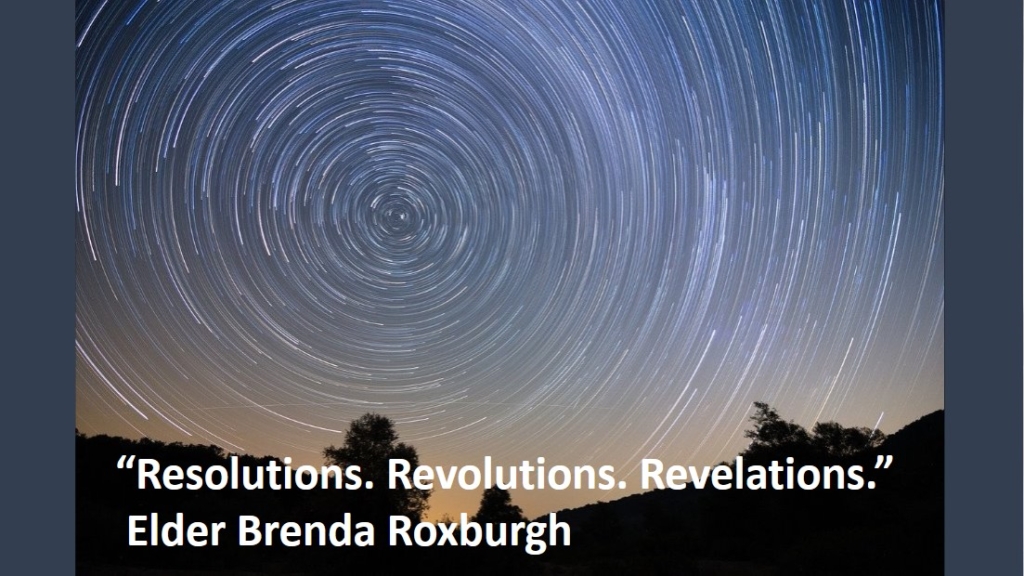 What will the light of Epiphany shine on in your life this year?
What will the light of Epiphany shine on in your life this year?Will it reveal something new in your relationship with God?
Will it spark a revolution in how you live your life?
We welcome Elder Brenda Roxburgh to our pulpit this Sunday, with her sermon titled ‘Resolutions. Revolutions. Revelations.’
To prepare, read ahead: Isaiah 60: 1-6 and Matthew 2: 1-12.

We welcome Elder Eric Prugh to our pulpit this Sunday, with his sermon titled ‘Letting Go, Letting God”
To prepare, read ahead: Psalm 142; Roman 8: 1-8,28; Matthew 11:27-30.

Join us for a special Christmas Eve service at 7 p.m. Christmas Eve. We will celebrate Christ’s birth with a number of beloved Christmas carols and a message that asks us to consider the “uncountable” gift that is our Saviour!
For those of you joining us by Zoom, please use the same link as for our Sunday morning services. For your convenience the link is below.
Once again our best wishes for a very Merry Christmas and many blessings in 2025!

Love magnifies the beloved. It notices the unnoticed. It heralds the unheralded. It calls down blessings on what has been ignored and overlooked. Love is a cherishing attention that requires our whole hearts and our whole selves.
Having been noticed and favoured by God, the virgin Mary erupts in a love song. Before she was one of many women, not particularly noteworthy, just one face among many. But now, God’s notice and love transforms her into one who will be agelessly blessed.
How do we, as Christ’s agents in Peterborough, notice those who may feel invisible? Can we give them time, attention, a listening ear, and by so doing show God’s love for them?
To prepare, read ahead: Micah 5:2-5 and Luke 1:39-55.
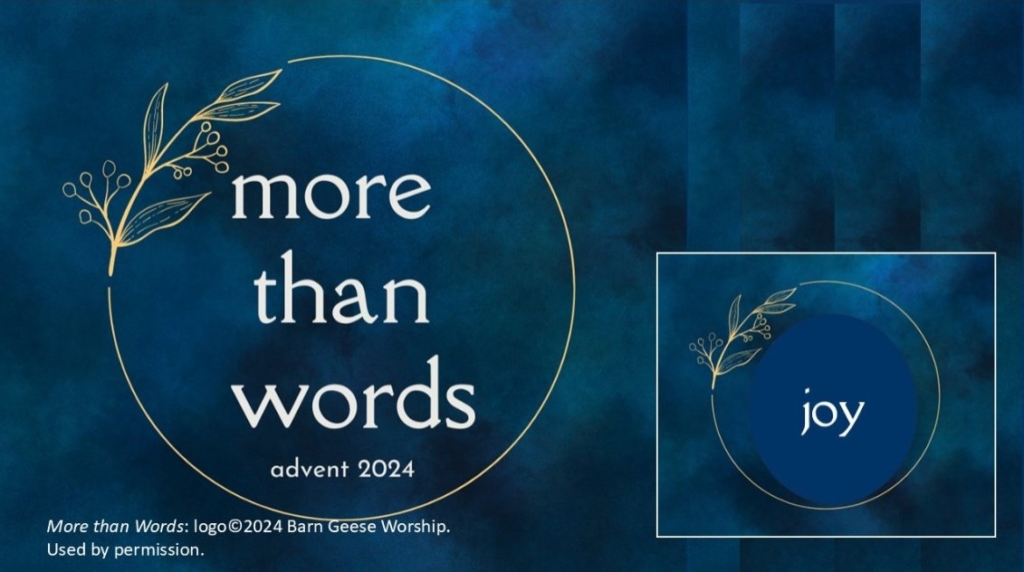 This week we have seen images of joyful crowds in Syria celebrating the fall of the Assad dynasty, a dynasty marked by violence, corruption, supression of human rights and more. It is a reminder to us that when things seem bleak, suddenly and often unexpectedly, a breakthrough can occur and with it a joy buried and smothered by worry, want and sorrow, can erupt and overflow.
This week we have seen images of joyful crowds in Syria celebrating the fall of the Assad dynasty, a dynasty marked by violence, corruption, supression of human rights and more. It is a reminder to us that when things seem bleak, suddenly and often unexpectedly, a breakthrough can occur and with it a joy buried and smothered by worry, want and sorrow, can erupt and overflow.
This Sunday we will study John the Baptist’s words to the crowds who flocked to see him on the banks of the Jordan river. His words seem brutal. He calls his listeners, a “brood of vipers” ! At first glance it seems that John is more of a killjoy than a bringer of joy, an announcer of Good News for all people!.
Yet the Holy Spirit has drawn these crowds there and they ask John “What shall we do?” In his answer we find enduring joy, a joy for all where no one is in want, no one is excluded or exploited, and everyone is transformed by exuberant, unexpected joy. And couldn’t we all use more of that?!
To prepare, read ahead: Zephaniah 3:14-20 and Luke 3:7-18
 This Sunday we will pause our “More than Words” Advent series for a special “Lessons and Carols” service. Please join us as we continue our journey toward Bethlehem and the birth of Jesus Christ. This service has more than the usual amount of music with a mixture of familiar carols and advent pieces, including an anthem from our Choir entitled: “Creation shall be at Peace.” A wonderful service for the whole family.
This Sunday we will pause our “More than Words” Advent series for a special “Lessons and Carols” service. Please join us as we continue our journey toward Bethlehem and the birth of Jesus Christ. This service has more than the usual amount of music with a mixture of familiar carols and advent pieces, including an anthem from our Choir entitled: “Creation shall be at Peace.” A wonderful service for the whole family.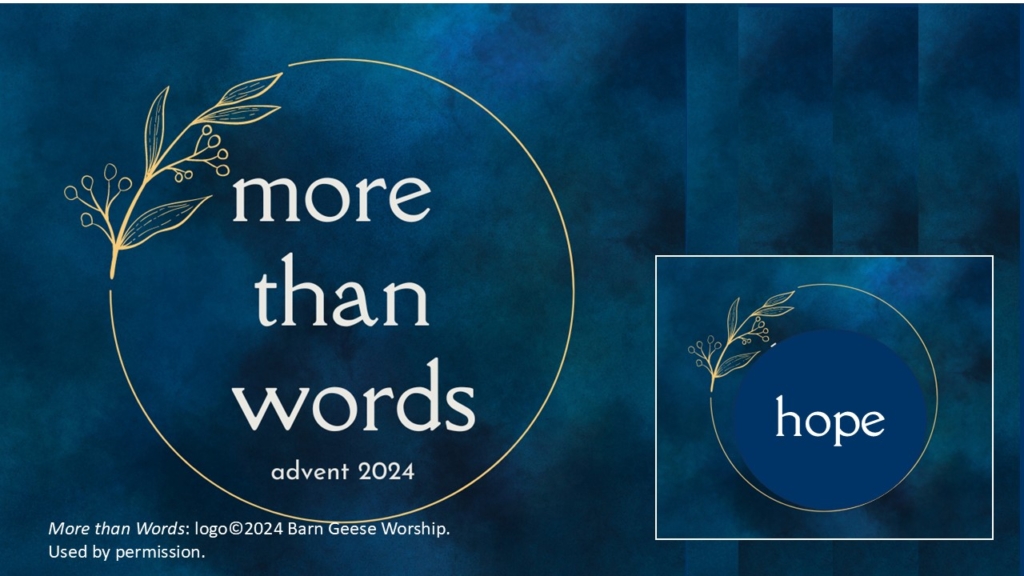 This Sunday we continue our “More than Words” Advent series with a look at the word Hope. Just as care is sometimes confused with love, so too hope can be confused with optimism.
This Sunday we continue our “More than Words” Advent series with a look at the word Hope. Just as care is sometimes confused with love, so too hope can be confused with optimism.The renowned theologian Juergen Moltmann, wrote a classic text on the subject called A Theology of Hope. In it he helpfully explains the difference between hope and optimism. Both, he says entail positive expectations with regard to the future. But they are radically different stances toward reality.
Have I lost you? Here’s a way to think about it: If my daughter Rachel could pick up Little Bear and read it when she was in kindergarten, I could legitimately be optimistic that she would do reasonably well in the first grade. If extrapolation is incorrect, optimism is misplaced, illusory. Perhaps my younger daughter Stephanie is very good at doing cartwheels as a young child (which she was), but it would have been foolish of me to bet that based on that skill alone she would win an Olympic gold medal in gymnastics.
Our positive expectations of the future are based mostly on such extrapolative thinking. We see the orange glow on the horizon, and we expect that morning will be bathed in sunshine. Such informed, grounded optimism is important in our private and professional lives, for the functioning of families, economy and politics. But optimism is not hope.
One of Moltmann’s lasting contributions in Theology of Hope was to insist that hope, unlike optimism, is independent of people’s circumstances. Hope is not based on the possibilities of the situation and on correct extrapolation about the future. Hope is grounded in the faithfulness of God and therefore on the effectiveness of God’s promise.
This is the hope that energizes to work for positive change even when as the world gives into despair.
To prepare, please read: Jeremiah 32: 1-12; 33:1-16 and Luke 21:25-36.
Sunday Nov 24 2024 - More Than Words: Justice
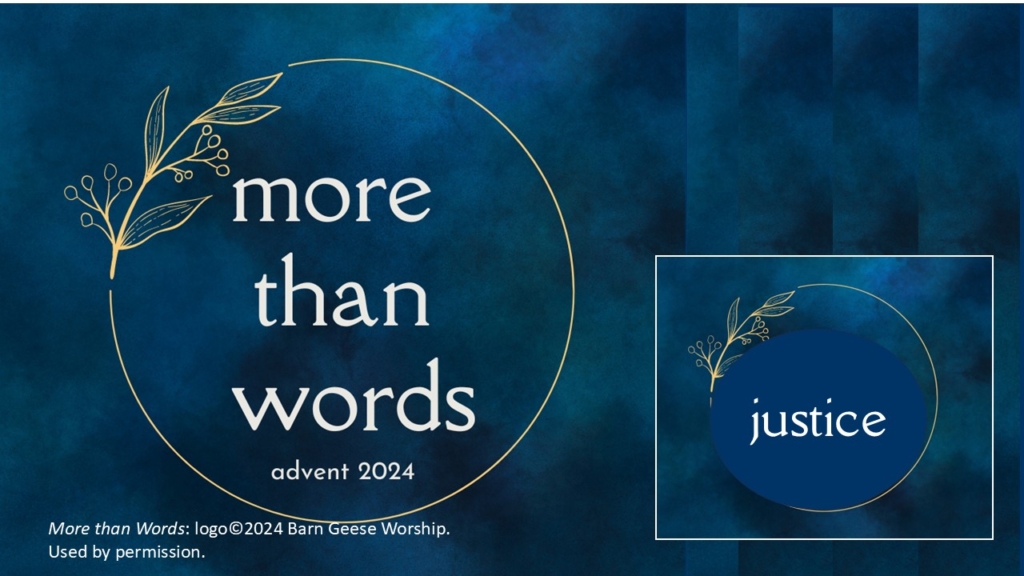 Maybe, like me, you grew up watching courtroom TV such as “The Peoples’ Court” or “Judge Judy.” If so, you might have come to the conclusion that justice is about fairness, responsibility and keeping your word. I think we’d gladly use that definition in daily life. We often see justice as people getting what they deserve, and Judy certainly tried to make sure everyone received what they were owed, that everyone paid their dues and that no one got a free ride, and that no one was treated unfairly.
Maybe, like me, you grew up watching courtroom TV such as “The Peoples’ Court” or “Judge Judy.” If so, you might have come to the conclusion that justice is about fairness, responsibility and keeping your word. I think we’d gladly use that definition in daily life. We often see justice as people getting what they deserve, and Judy certainly tried to make sure everyone received what they were owed, that everyone paid their dues and that no one got a free ride, and that no one was treated unfairly.But in scripture, justice isn’t meted out by a pop-culture icon. Justice is the dominion of the Divine. The ability to rule belongs to God and to those whom God has chosen to lead. They are the ones who make sure that dues are paid and that there is a proportional retribution for injustices committed against everyday people.
But what are we to make of our ruler Jesus, standing before Pilate in the gospel lesson from John 18? Jesus is hardly on a throne. He isn’t sitting above anyone. He isn’t administering justice or issuing rulings. Jesus is the one on trial, and the trial itself is a sham, far from just. Join us this Sunday as we study two trials: Jesus trial before the Sanhedrin (the Jewish rulers) and his trial before Pilate. What do they teach us about what justice looks like in Jesus’ kingdom and how we can “do likewise” here and now?
To prepare, please read: 2 Samuel 23:1-7 and John 18:28-40.
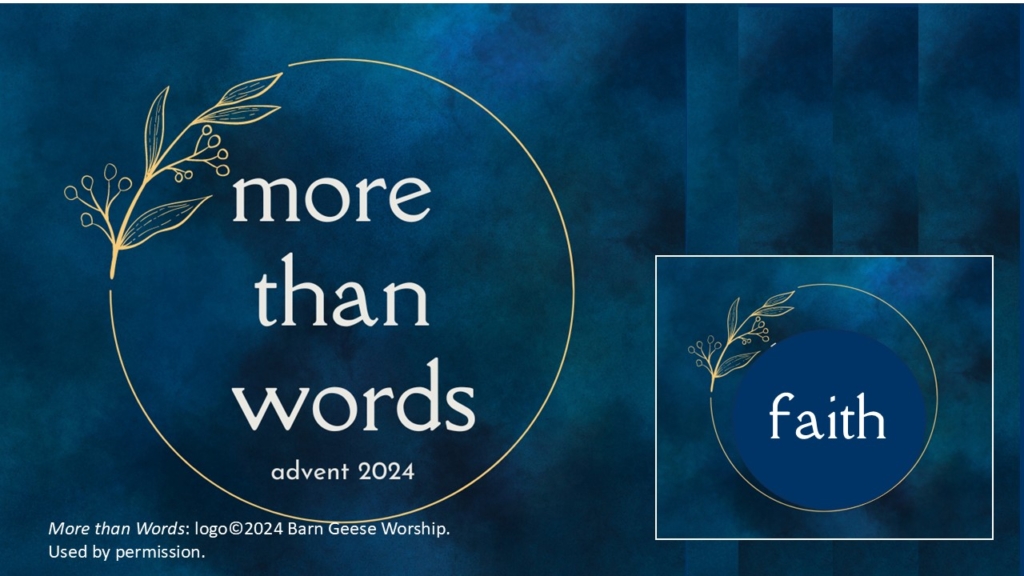 This Sunday we will continue our new Advent sermon series titled “More than Words” as we look at scriptures that bring to life the word: faith. It’s one thing to say we have faith, but quite another to act out our faith.
This Sunday we will continue our new Advent sermon series titled “More than Words” as we look at scriptures that bring to life the word: faith. It’s one thing to say we have faith, but quite another to act out our faith.We often talk about faith as something we must generate within ourselves: “Just have a little faith,” you might have heard (or maybe you have even said this to someone) while struggling with a difficult problem or relationship. This command to “just have a little more faith” suggests that faith is a matter of will power. But faith, like all the Advent themes we’re exploring this season is a gift from God. However, God gifts us all differently and faith is a gift that not everyone has. The good news is that faith isn’t something you are required to have to come to church. Rather, church is the place to go when you don’t have faith for yourself, because it’s where other people carry faith for you. We lean on each other in loving vulnerability.
If we want to know what faith is, we should begin with God’s own faithfulness. This Sunday we’ll consider the story of Hannah, who longed for a son and believed God could fill her barren womb. She was right. What can we learn from her example? We’ll also consider “misplaced” faith as we eavesdrop on a conversation between Jesus and his disciples. Sometimes it is easier to place our faith in visible, concrete displays of power and wealth than in the honest vulnerability that is the true source of our salvation.
 After our Remembrance Day commemoration portion of our service, we will transition into our regular service of worship. This year we are going to have an extended advent of seven weeks versus the usual four. Our theme for Advent this year is “More than Words.” This won’t be a look at how to control our tongues or advice to choose our words carefully…although both are worthwhile pursuits!
After our Remembrance Day commemoration portion of our service, we will transition into our regular service of worship. This year we are going to have an extended advent of seven weeks versus the usual four. Our theme for Advent this year is “More than Words.” This won’t be a look at how to control our tongues or advice to choose our words carefully…although both are worthwhile pursuits!
No, instead, we’ll be asking how do we, as Christians embody these words. How do we show them in our actions, attitudes, priorities and how does our triune God — Father, Son and Holy Spirit show these in scripture and practice?
Our first word is “care.” Care often gets confused with love. You can care about something without necessarily loving it. For example, if you care about your body you might eat more green vegetables and exercise, although you don’t particularly love either. Making a distinction between love and care isn’t just wordplay; it’s a necessity. Care is characterized by devotion, consistency, attention to detail, and some sense of obligation. It may require specialized skills, or it may just require time. Either way, care requires consistent investment — attention provided over the long haul.
Scripture is full of examples of God’s care for us, and this Sunday we’ll study how different leaders cared (or not) for the people in their communities. God so cared for this world, that He sent his only son, Jesus, at Christmas to show us how to live, love and care for others.
During Advent you will also receive a weekly devotional every Monday morning in your mailbox helping us to reflect and pray about the word we’ve studied the previous Sunday. Your first devotion will arrive November 11th.
To prepare, please read: 1 Kings 17: 8-24 and Mark 12:38-44
BOOK CLUB
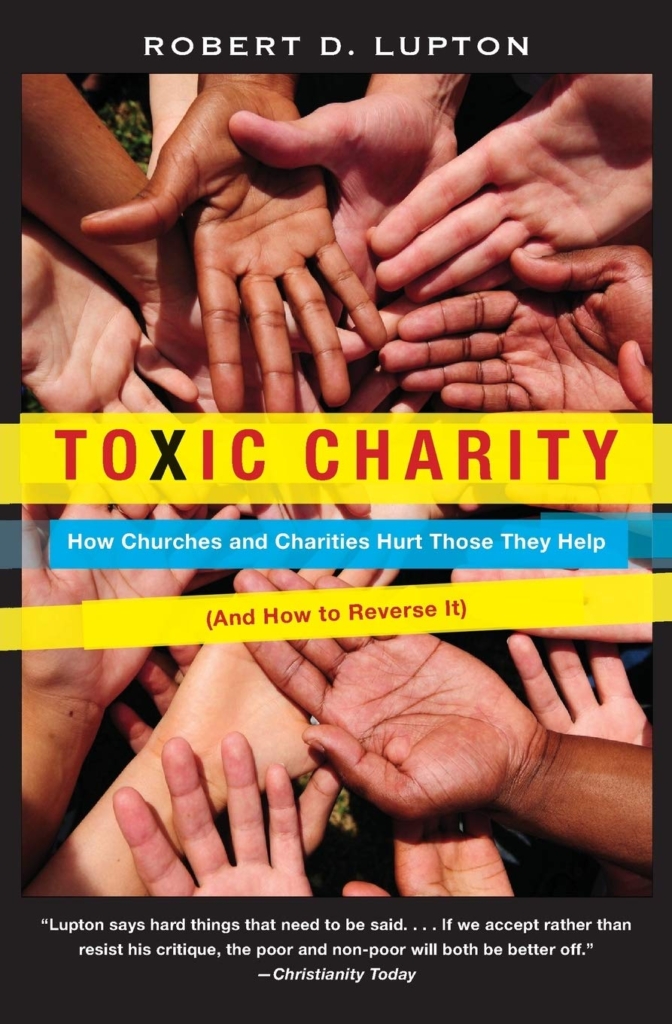 Have you ever wondered if your charitable donations or projects are helping or hurting? Do you wish you could give a “hand up, rather than a hand-out”? If so, you’ll be interested in joining our Lenten Book club! We’ll be reading “Toxic Charity: How churches and charities hurt those they help (and how to reverse it)” by Richard Lupton. The group will meet Tuesdays from Noon – 2 p.m. from May 6th – June 3rd included. A hot, homemade soup will be provided, just bring your own beverage, salad or soup to complete your lunch! If you’d like to join the club via Zoom, let us know and we will create a link!
Have you ever wondered if your charitable donations or projects are helping or hurting? Do you wish you could give a “hand up, rather than a hand-out”? If so, you’ll be interested in joining our Lenten Book club! We’ll be reading “Toxic Charity: How churches and charities hurt those they help (and how to reverse it)” by Richard Lupton. The group will meet Tuesdays from Noon – 2 p.m. from May 6th – June 3rd included. A hot, homemade soup will be provided, just bring your own beverage, salad or soup to complete your lunch! If you’d like to join the club via Zoom, let us know and we will create a link!
We have negotiated a discounted price of $18.75 for the book from a local bookseller and have 10 copies available at that price. To get your discounted copy, please email Joanne Boonstra at office@stpaulspeterborough.ca.
If you prefer to get your own copy of the book, it is available from Amazon. A kindle version is available for $11 or a paperback for $21.00.
Thursday Mar 6th 2025 6:30pm - Art Exhibit / Open House
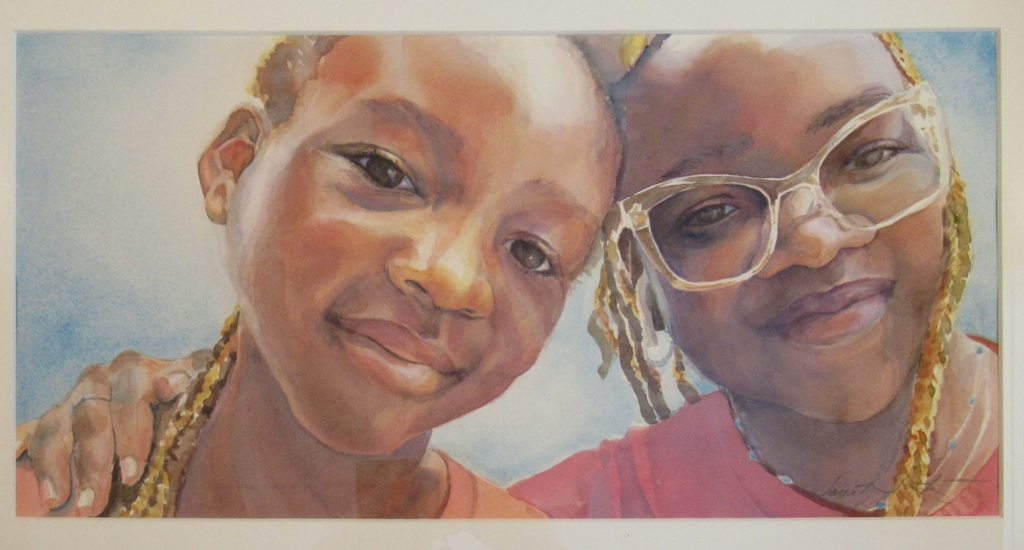 St. Paul’s is pleased to have entered a collaboration with local Peterborough artist Janet Lutz as she stages her first ever art exhibition. Entitled “Seeing and Being Seen” the exhibit features 21 watercolour portraits of those we may have encountered on Peterborough’s streets, shelters, coffee shops, and other local spaces. Speaking of her inspiration for creating the collection Janet says, “These are people in our community, people we might pass by without noticing or engaging in conversation, but they are no less worthy of our attention, care and affection – perhaps even more so. All of us need to ‘be seen’, to be acknowledged and to have the dignity of having our basic needs met.” All portraits in the collection are unlabeled and the persons featured unidentified. The viewer is encouraged to view those featured as a neighbour, potential friend, family member.
St. Paul’s is pleased to have entered a collaboration with local Peterborough artist Janet Lutz as she stages her first ever art exhibition. Entitled “Seeing and Being Seen” the exhibit features 21 watercolour portraits of those we may have encountered on Peterborough’s streets, shelters, coffee shops, and other local spaces. Speaking of her inspiration for creating the collection Janet says, “These are people in our community, people we might pass by without noticing or engaging in conversation, but they are no less worthy of our attention, care and affection – perhaps even more so. All of us need to ‘be seen’, to be acknowledged and to have the dignity of having our basic needs met.” All portraits in the collection are unlabeled and the persons featured unidentified. The viewer is encouraged to view those featured as a neighbour, potential friend, family member.

None of the portraits are for sale, but will be part of a “roving” art installation that moves around the city, but St. Paul’s is the first to showcase them! We are hosting a reception and meet and greet with the artist at St. Paul’s on Thursday, March 6th from 6:30 p.m. – 7:30 p.m. Janet will speak about her work at 6:45 p.m. and Ashlee Aitken, General Manager of Kawartha Food Share (KFS) will also speak about food insecurity in our community and the work that KFS is doing to help alleviate this increasing issue. We hope many of you will plan to attend. This is a great event to which to invite friends and family members.
New Grief Support Group
 If you, or someone you know has recently experienced the death of a loved one, St. Paul’s would like to invite you to join a community of support called “GriefShare” beginning in January. Over the course of 13 weeks we will explore some of the common experiences and feelings individuals face when a loved one dies through video presentations and group discussions. Among the topics covered are: loneliness and fear; regrets and anger; how grief affects other relationships and duties within the remaining family, how to cope with difficult emotions, brain fog and fatigue and much more.
If you, or someone you know has recently experienced the death of a loved one, St. Paul’s would like to invite you to join a community of support called “GriefShare” beginning in January. Over the course of 13 weeks we will explore some of the common experiences and feelings individuals face when a loved one dies through video presentations and group discussions. Among the topics covered are: loneliness and fear; regrets and anger; how grief affects other relationships and duties within the remaining family, how to cope with difficult emotions, brain fog and fatigue and much more.OFFERING
You can send weekly or monthly offering by mail, by dropping off at the church’s new letter slot in the green door, by Pre Authorized Remittance (PAR), and through www.CanadaHelps.org by searching for St. Paul’s Presbyterian Church Peterborough. Electronic bank transfer (e-transfers) can be sent to finance@stpaulspeterborough.ca



